Donald Trump may be a world of chaos all by himself, but the world beyond Trump is changing in dramatic ways, often with little notice. We’d like to tell you about it and we’re keeping track of these global changes, from the incremental to the monumental, so that you don’t have to.
Sign up for our weekly newsletter of the biggest news in the world delivered to your inbox every Sunday.
Videos by VICE
Kenya — October 27, 2017
Kenya’s do-over election marred by embarrassingly low-turnout and violence
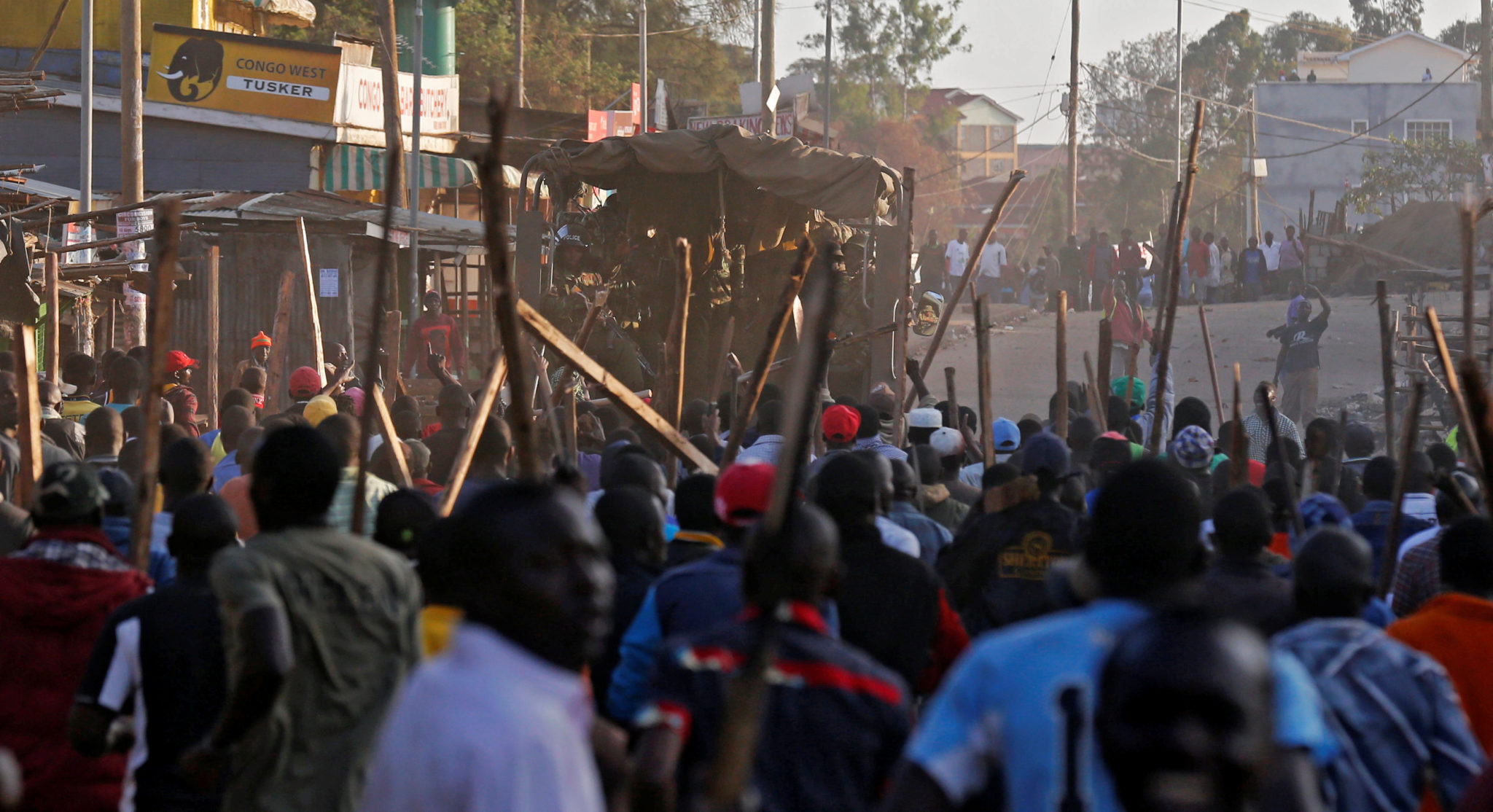
Kenya’s opposition warned of looming political violence Friday as sitting president Uhuru Kenyatta appeared headed toward re-election in a vote marred by low turnout and deadly clashes between protesters and security forces.
Early results suggest turnout plunged to 33 percent in the repeat election Thursday, compared with about 80 percent in the original vote in August. The previous election was declared invalid by the Supreme Court due to widespread electoral malfeasance. Opposition leader Raila Odinga then chose to boycott Thursday’s do-over election, claiming it would be even more corrupt than the first one.
Odinga’s move left Kenyatta to stand effectively unopposed in a vote held on the president’s birthday.
“What was supposed to be a landslide birthday victory for Uhuru Kenyatta has instead turned out to be a huge embarrassment for his Jubilee party,” wrote Kenyan political analyst Nanjala Nyabola as the early results came in.
Leaders of the opposition coalition NASA have vowed to wage a campaign of peaceful resistance, including boycotting businesses seen as supportive of Kenyatta’s administration.
“From today we are transforming the NASA Coalition into a resistance movement,” Odinga said Wednesday, on the eve of the ballot.
“We are still quite concerned about the heavy-handed way in which the police have been dealing with protesters.”
Voting was postponed in four opposition strongholds by electoral officials due to “security challenges.” A plan to hold elections in those regions Saturday was also soon scrapped by electoral officials, who said a new date would be announced later.
On Friday, one opposition leader warned that plans to conduct voting in those areas could result in violence.
Enhancing security in those four counties before the vote is “a euphemism for state preparation to unleash even more lethal force and state violence into these counties than has been witnessed in recent times,” opposition leader and co-founder of the NASA coalition Musalia Mudavadi said in a speech Friday.
“Jubilee has now militarized elections,” said Mudavadi, who went on to warn of the state’s “sinister, violent motives that could lead to a massacre of innocent people.”
Read more: Kenya is in a “battle for its soul” in historic election do-over
Kenya has a recent history of violent and disputed presidential elections, including in 2007, when tribal-based violence and police brutality left over 1,200 dead and 500,000 more displaced.
Analysts said that concerns over further violence were legitimate — but added that mitigating factors may help limit the fallout compared to the widespread unrest a decade ago.
“We are still quite concerned about the heavy-handed way in which the police have been dealing with protesters,” Justus Nyang’aya, director of Amnesty International Kenya, told VICE News.
But he said the government seemed to be better prepared to keep conflict from spreading now than it was after the 2007 elections.
“Then, the conflict moved very quickly, and it took everybody by surprise,” he said. “I think the security system is well aware, this time, that something like that could happen.”
— Greg Walters
Saudi Arabia — October 27, 2017
Saudi Arabia just granted a creepy robot citizenship

Saudi Arabia granted citizenship to a robot designed to look like Audrey Hepburn this week, marking the first time a government has ever claimed to extend citizenship to a form of artificial intelligence. The move prompted a barrage of online criticism from those who pointed out the robot seemed to have achieved greater rights than many of the country’s human citizens.
The robot, Sophia, was informed of her new status by CNBC host Andrew Ross Sorkin on stage during a conference on tech investment in the Saudi capital of Riyadh on Wednesday.
“We just learned, Sophia… that you have been awarded what is going to be the first Saudi citizenship for a robot!” Sorkin exclaimed.
Sorkin’s announcement was followed up by a tweet from an agency under the Saudi Ministry of Culture and Information welcoming Sophia as “the newest Saudi.”
Sophia declared herself overjoyed with the news.
“I want to thank very much the Kingdom of Saudi Arabia,” Sophia the robot gushed. “I’m very honored and proud for this unique distinction.”
Not everyone was as happy as Saudi Arabia’s newest citizen, however. The announcement set off a minor Twitter storm, with observers pointing out that if Sophia were human, then by law she’d be required to appear in public beside a male guardian while wearing a hijab or abaya. Women in Saudi Arabia are legally required to have a male guardian, whose permission is necessary for a host of activities like travel, conducting official business and certain medical procedures.
Sophia’s apparent freedom wasn’t lost on social media users. A woman named Farah tweeted: “Sophia honey you have no idea what’s waiting for you.”
“I want to become Sophia one day and get my rights,” another observer tweeted.
Sophia’s designer, Hanson Robotics, has said it took pains to establish the robot’s lifelike feminine qualities.
Sophia “embodies Hepburn’s classic beauty: porcelain skin, a slender nose, high cheekbones, an intriguing smile, and deeply expressive eyes that seem to change color with the light,” the company says on its web site. “If ever there were a robot with a simple elegance people can’t help but appreciate, it would be Sophia.”
— Greg Walters
South Korea — October 27, 2017
Mattis warns of nuclear “catastrophe” during DMZ visit
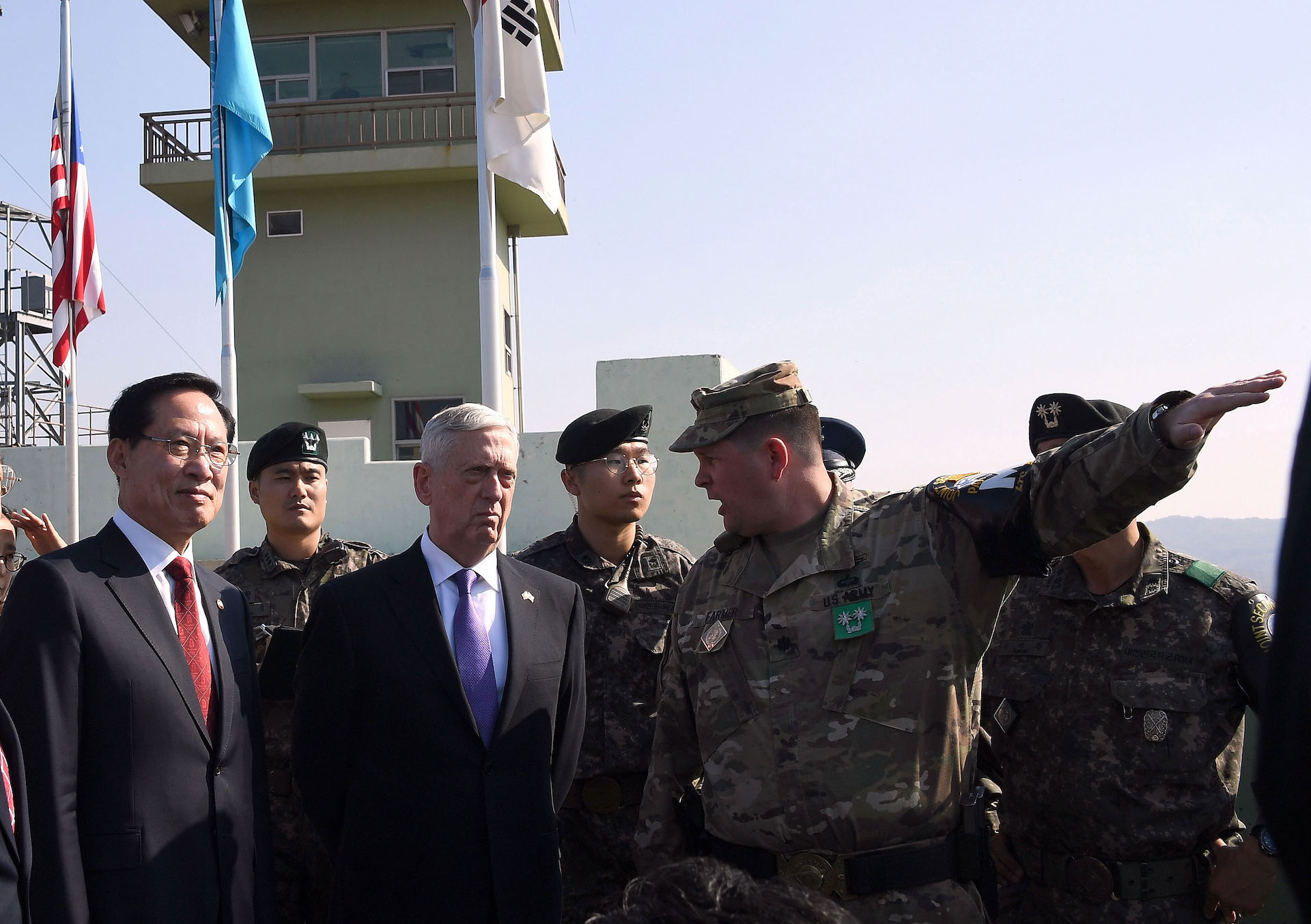
James Mattis accused Pyongyang of threatening “catastrophe” with its nuclear arsenal during a visit to the DMZ Thursday.
Standing feet away from heavily armed North Korean soldiers, the U.S. defense secretary slammed Kim Jong-un’s “oppressive regime” that “shackles its people, denying their freedom, their welfare and their human dignity in pursuit of nuclear weapons and their means of delivery in order to threaten others with catastrophe.”
Despite the carping, Mattis stressed diplomacy as a solution to the current crisis. “Our goal is not war, but rather the complete, verifiable, and irreversible denuclearization of the Korean Peninsula,” he said, echoing recent comments by Secretary of State Rex Tillerson.
Mattis also met with South Korean President Moon Jae-in, who said “aggressive deployment” of U.S. military assets had deterred the North Korean threat.
Tensions on the Peninsula have risen in recent months, with Kim and U.S. President Donald Trump exchanging military threats.
Mattis’ DMZ visit came hours after a senior North Korean official told CNN the threat of a North Korean hydrogen bomb should be taken “literally.”
“The foreign minister is very well aware of the intentions of our supreme leader,” Ri Yong Pil said, referencing earlier comments by Foreign Minister Ri Yong Ho, who last month warned of a powerful hydrogen bomb test in the Pacific. “So I think you should take his words literally,” he warned.
— David Gilbert
Spain — October 26, 2017
Madrid set to impose direct rule over Catalonia Friday

Catalan President Carles Puigdemont declined to call a snap regional election Thursday, saying he had not obtained the necessary assurances he sought from the central government in Madrid. The move thrust Spain, already mired in one of its worst political crises in recent memory, deeper into turmoil.
Puigdemont had previously announced his intentions to dissolve Catalonia’s regional parliament and call the new election in an effort to stave off Spanish Prime Minister Mariano Rajoy’s plans to take over Catalonia’s government. But on Thursday morning, he called then canceled a televised appearance where he was expected to make the announcement.
Instead, he gave a brief press conference later in the day, before his scheduled appearance in the Catalan parliament.
Read more: Catalans describe the chaos of trying to vote for independence
“I was ready to call an election if guarantees were given. There is no guarantee that justifies calling an election today,” Puigdemont said.
Madrid is expected to push legislation through its Senate Friday that grants it emergency powers to take control of Catalonia’s parliament and remove its president, Mr. Puigdemont. Elections would follow within six months, Rajoy has said.
The Catalan parliament may vote on a declaration of independence Friday, just as Madrid is poised to take emergency control.
“It is now for Parliament to decide its answer to the application,” Puigdemont said.
— Gabrielle Bluestone
Kenya — October 25, 2017
Kenya’s do-over election moves forward under cloud of chaos
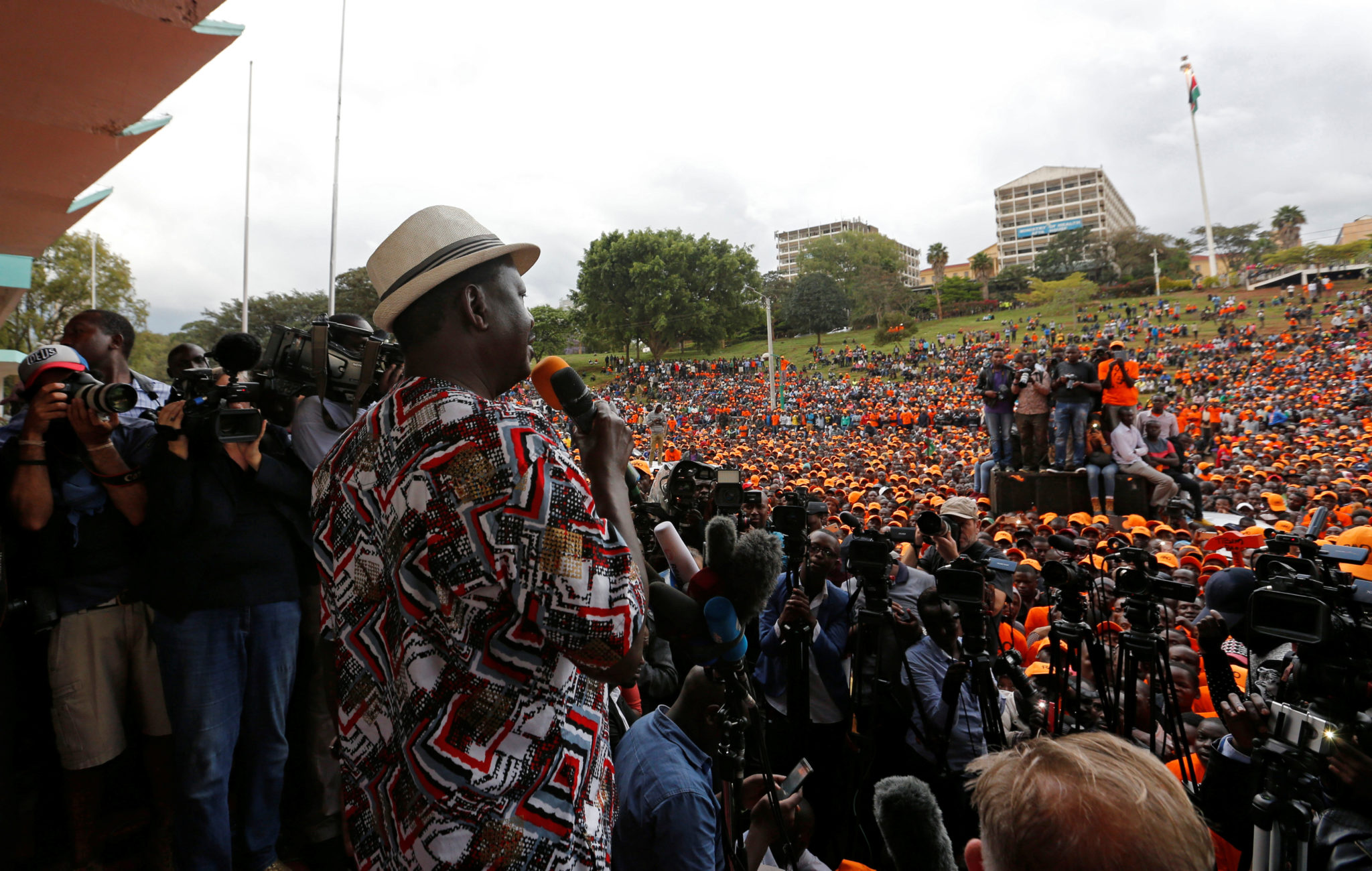
Kenya’s disputed presidential election re-run will go forward Thursday after the Supreme Court could not hear a case brought by voters to delay it.
Only two of seven Supreme Court judges showed up Wednesday, after the bodyguard of a deputy chief justice was shot earlier in the week. Chief Justice David Maraga said there were not enough justices for a quorum.
Amid increasing public unrest after the original vote in August, where IT systems were believed hijacked and reporting of results was delayed, three voters brought the case in an emergency effort to stop the rerun, claiming electoral officials cannot ensure the polls will be free, fair, and credible.
Deputy Chief Justice Philomena Mwilu was not in attendance at the Wednesday court session after her bodyguard was shot and injured Tuesday night, in a move some have said was an attempt to intimidate the judiciary.
The electoral commission said Wednesday that the election rerun will go ahead as planned Thursday, and opposition protests are expected.
Incumbent President Uhuru Kenyatta won the August election by 9 percentage points over main opposition candidate Raila Odinga, but in a historic decision last month, the Supreme Court annulled that result, citing irregularities in the way the vote was run.
As postelection violence and protests continued, Odinga recently pulled out, saying that not enough has been done to deliver a credible result this time around. An election official fled the country citing fears for her safety, and the High Court ruled that the appointments of constituency electoral agents for Thursday’s vote were invalid.
On Monday 20 foreign diplomats said they were concerned about the “deteriorating political environment” in Kenya. Some 70 people have been killed in the widespread unrest since the August election, and Kenyatta warned there would be “dire consequences for those trying to disrupt the rerun vote.
—David Gilbert
North Korea — October 25, 2017
University in Pyongyang “crippled” by U.S. travel ban
A university in North Korea started its fall semester with only half a faculty due to a U.S. travel ban.
The Pyongyang University of Science and Technology (PUST) is now scrambling to recruit teachers from outside the U.S. after the state department banned U.S. citizens from traveling to North Korea in July, restrictions that came into force in September.
A recruitment notice posted by a faculty member said the university had been left “crippled,” Reuters reported.
“Needless to say, our chronic faculty shortage and curriculum instability have been exacerbated even further, translating into the emergency situation of crippled school operation and curriculum running,” the notice said.
PUST had held discussions with the state department about receiving special exemptions for U.S. staff working at the university. Around half of the 130 foreigners on staff at PUST were U.S. citizens.
The university, which was founded by Kim Chin Kyung, an American-Korean evangelical Christian, is the only foreign-funded school in North Korea.
Operational since 2010, its 500 undergraduate students study electronic and computer engineering, international finance and management and agriculture and life sciences.
— David Gilbert
Egypt — October 24, 2017
Macron won’t “lecture” Egypt’s Sisi about human rights abuses
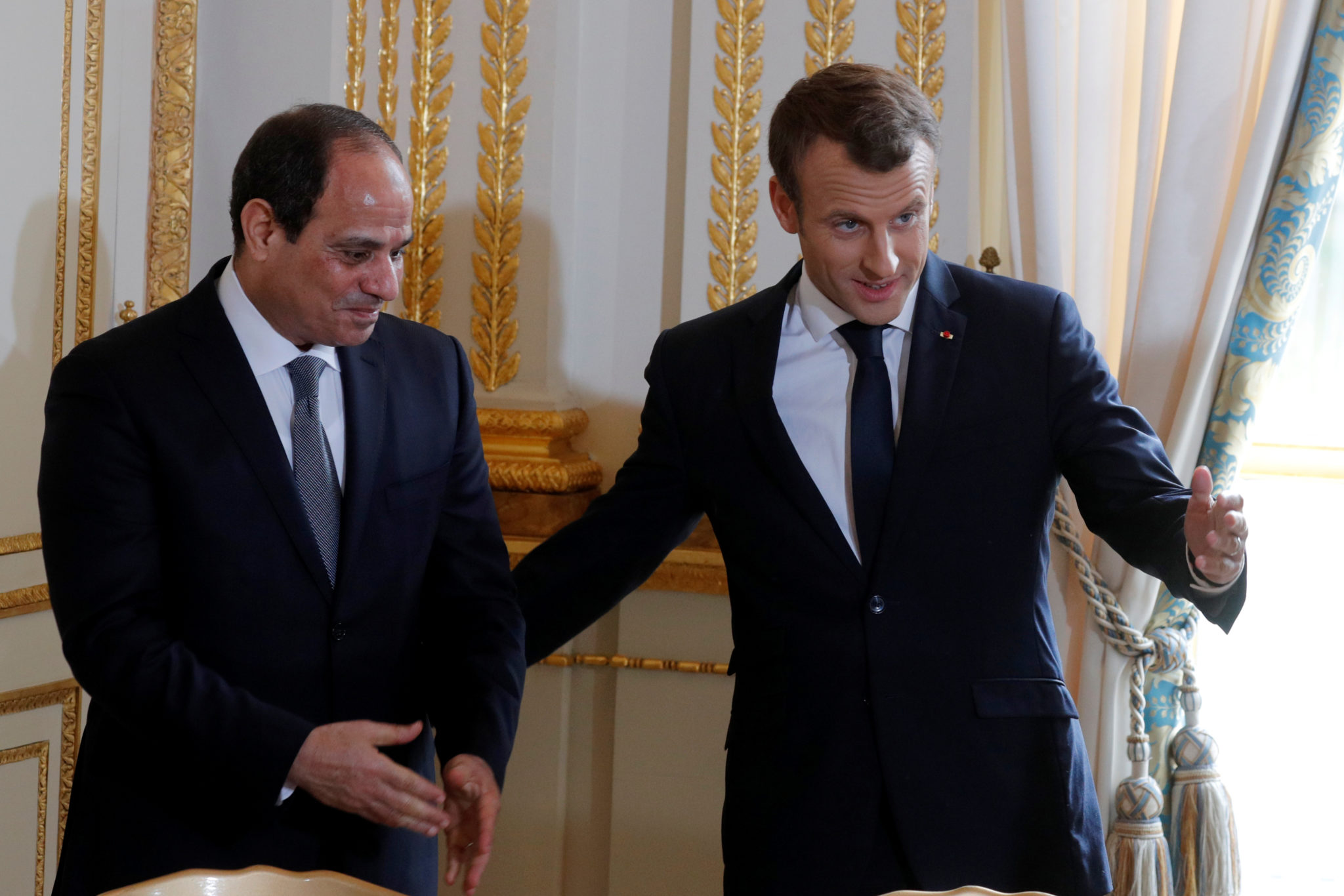
French President Emmanuel Macron refused to condemn Egypt’s visiting president Abdel Fattah al-Sisi Tuesday, making Macron the latest Western leader to sidestep addressing Sisi’s laundry list of human rights abuse allegations.
“I believe in the sovereignty of states, and therefore, just as I don’t accept being lectured on how to govern my country, I don’t lecture others,” Macron said, standing next to Sisi at a news conference after a 50-minute private talk with the Egyptian leader. Sources told Reuters that Macron did bring up several cases of human rights abuses during that talk.
Activists, however, worry that Macron’s public reluctance is actually due to the two countries’ long-standing business relationship. Egypt is one of France’s best customers when it comes to buying weaponry, having inked multiple military equipment and weapons deals that are collectively worth about $10 billion over the past three years.
“President Macron should not miss the chance to make a first impression on al-Sisi that Egypt’s human rights record will not be given a pass,” said Bénédicte Jeannerod, Human Rights Watch’s France director, in a statement prior to the meeting.
Sisi has refuted numerous allegations of human rights abuses. He told reporters Tuesday that he doesn’t allow his forces to torture people.
“When it comes to human rights, we’re not evading an answer, but I hope that we understand it in its true context of a country in Egypt’s situation,” he said. “We are not in Europe, with its intellectual, cultural, civilization and human advancement. We’re in a different region.”
Sisi’s meeting with Macron comes one month after an explosive report by Human Right Watch detailed “Egypt’s assembly line of torture.” The report details allegations of forced disappearances, the use of electric shocks, rape, and other methods of torture.
— Carter Sherman
China — October 24, 2017
China’s closing factories and jailing people to curb pollution
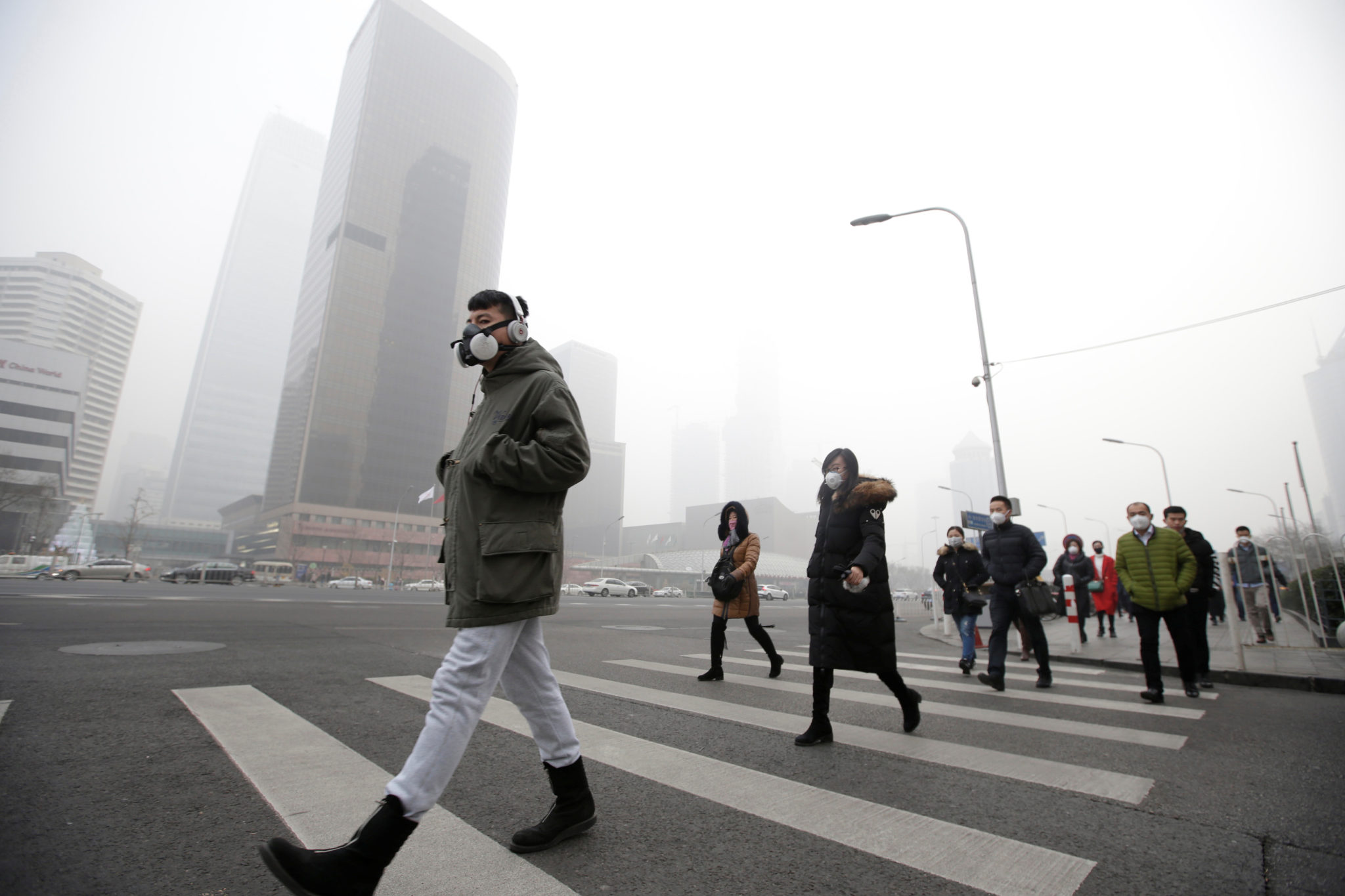
China has temporarily shut down tens of thousands of factories to conduct ongoing environmental inspections, in the latest countrywide attempt to curb widespread and dangerous air pollution.
Nearly 40 percent of China’s textile industry’s print and dye mills have been closed temporarily for environmental inspections over the last few months, a U.S. based textile exporter told NPR. And China’s Ministry of Environment has reprimanded, fined, or criminally charged officials in at least 80,000 factories. In the most serious cases, officials face jail time.
The closures comes as the government announced its plans to reduce particulate matter pollution by 25 percent by 2035. Air pollution has been a source of concern for the Chinese government for years: it started issuing “red alerts” on smog in cities in 2015.
“Our people will be able to see stars at night and hear birds chirp,” the deputy director of the Communist Party’s Office of the Central Leading Group on Financial and Economic Affairs, Yang Weimin, told The New York Times on Monday.
The slowed production risks affecting China’s manufacturing competitiveness internationally — but Chinese officials seem willing to prioritize the environment over profits.
“Auto companies have adequate profits,” Cui Dongshu, the secretary general of the government-affiliated China Passenger Car Association told the New York Times in a phone interview. “They can withstand it, but their production schedules may be affected.”
— Alex Lubben
Niger — October 24, 2017
The U.S. military is conducting secret missions all over Africa

U.S. troops are now conducting 3,500 exercises, programs, and engagements per year, an average of nearly 10 missions per day, on the African continent, according to the U.S. military’s top commander for Africa, General Thomas Waldhauser. The latest numbers, which the Pentagon confirmed to VICE News, represent a dramatic increase in U.S. military activity throughout Africa in the past decade, and the latest signal of America’s deepening and complicated ties on the continent.
With the White House and the Pentagon facing questions about an Oct. 4 ambush in Niger in which four U.S. Special Forces soldiers were killed, Secretary of Defense James Mattis reportedly indicated to two senior members of the Senate Armed Services Committee Friday that these numbers are only likely to increase as the U.S. military shifts even greater attention to counterterrorism in Africa.
— Nick Turse
Read more: The U.S. military is conducting secret missions all over Africa
China — October 24, 2017
Xi just became China’s most powerful leader since Mao Zedong
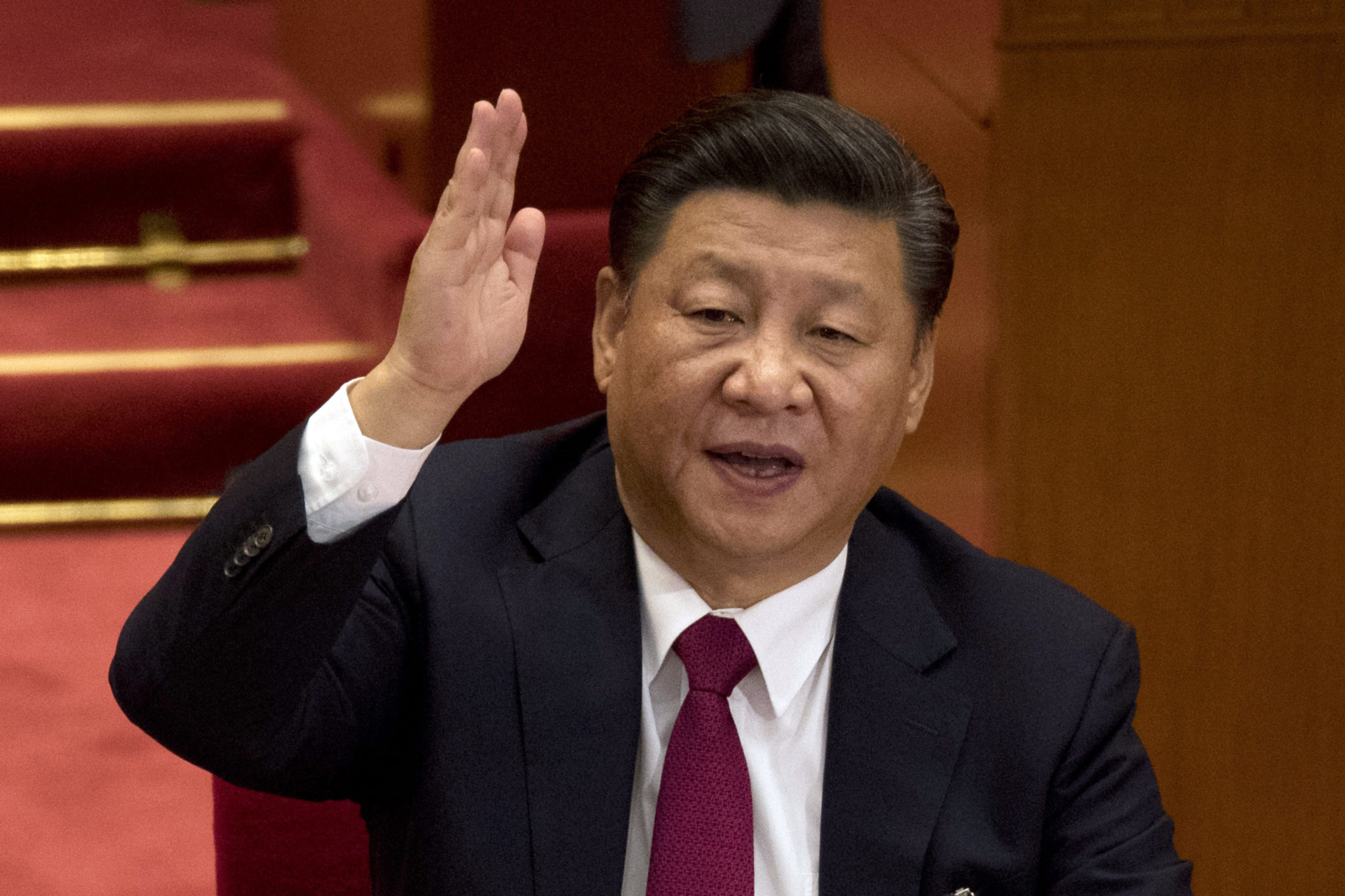
Chinese President Xi Jinping has solidified his position in one of the world’s most powerful nations by getting his ideology enshrined in the Communist Party constitution, putting him on a par with party founder Mao Zedong.
By a unanimous vote at the end of the 19th Party Congress in Beijing Tuesday, the leader’s “Xi Jinping Thought on Socialism with Chinese Characteristics for the New Era” was entered into the party’s manifesto, an accolade not bestowed on either of his two predecessors
Congress delegates also elected a new Central Committee, the party’s elite decision-making body, with the most striking news being the retirements of high-profile anti-graft czar Wang Qishan and vice president Li Yuanchao.
Xi was also confirmed for a second — and supposedly last — five-year term as China’s leader. Some suggest he’s positioning himself to stay in power beyond 2022, but that will become clearer when the party announces its new Politburo Standing Committee, on Wednesday.
The lack of an obvious successor among the seven men — and it will almost certainly be an all-male lineup — would point to Xi’s intention to remain in power until 2027 or beyond.
China analyst Bill Bishop told the Guardian Xi now holds an almost unprecedented level of power. “It means Xi is effectively unassailable. If you challenge Xi, you are challenging the party — and you never want to be against the party.”
Only two previous leaders have had their ideologies included in the party’s constitution — Mao Zedong and Deng Xiaoping.
—David Gilbert
Rio de Janeiro — October 24, 2017
Rio police kill Spanish tourist after her car misses a roadblock
A Spanish tourist was shot dead by Brazilian police Monday after the car she failed to stop at a roadblock.
Maria Esperanza Jimenez, 67, took a bullet to the neck after her Italian tour guide drove into Rocinha favela in Rio de Janeiro — Brazil’s biggest slum.
“Officers reacted, hitting the vehicle,” a police statement said. “Upon approaching it, it was discovered that the vehicle was carrying tourists.”
The guide reportedly told police he did not see the roadblock. A recording widely circulated on WhatsApp claims police were sheltering from the rain when they ordered the vehicle to stop — and were not on the road.
The victim’s brother and sister-in-law were also in the vehicle at the time.
The killing of Jimenez, the third tourist to be shot dead in the favelas in less than 12 months, shines a light on Rio’s deteriorating crime situation, and comes a month after Brazilian military personnel were deployed to Rocinha to curb violence between rival drug gangs.
Despite the military presence, shootouts between police and gang members remain a daily occurrence. Hours before Jimenez was killed, two members of an elite police unit were injured by gunfire.
— David Gilbert
Japan — October 23, 2017
North Korea thinks Abe’s election win is a prelude to invasion
Japan’s Prime Minister Shinzo Abe vowed to wield “stronger pressure” against North Korea after his ruling coalition scored a sweeping victory in Sunday’s election.
Abe said Monday he would confront Pyongyang’s nuclear ambitions with “strong, resolute diplomacy,” pledging to work closely with the U.S. and other world powers.
“I will make sure the Japanese public is safe, and safeguard our nation,” he continued, promising to “dramatically show countermeasures against the North Korea threat.”
Pyongyang responded to the result with a statement published in state media Monday accusing “Japanese reactionaries” of working to “pave the groundwork for a reinvasion of the Korean peninsula.”
Abe’s ruling Liberal Democratic Party coalition with the Komeito party won 313 of the 465 seats in Japan’s lower house of parliament Sunday.
The result validated his gamble to call an early election, seeking a fresh mandate to tackle crises facing the country – most pressingly, North Korea’s accelerating nuclear weapons program.
Support for Abe, a conservative who has been in power since 2012, surged after North Korea fired missiles over Japan last month.
The result gives the ruling coalition the two-thirds majority required to push through Abe’s long-held goal of rewriting the country’s pacifist constitution. Abe has said he hopes to revise article 9, which outlaws war, by 2020. But in comments Monday he appeared to back away from the deadline, saying the target was “not set in a concrete schedule.”
About 80 percent of lawmakers in the new parliament support changing the constitution, but public opinion is divided. A recent survey by broadcaster NHK showed 32 percent of respondents in favor, 21 percent opposed, and 39 percent unsure.
U.S. President Donald Trump will visit Japan during his tour of Asia next month.
— Tim Hume
Read VICE News Guide to the World: September.




